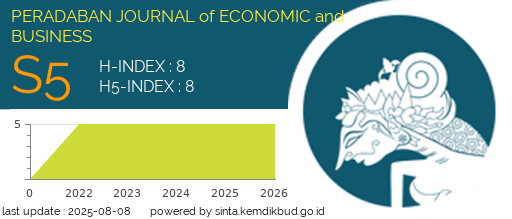The Influence of Islamic leadership on Employee Psychological Well-Being with the Mediation of Organizational Justice
DOI:
https://doi.org/10.59001/pjeb.v3i2.189Keywords:
Islamic leadership, organizational justice, well-beingAbstract
This study explores the relationship between Islamic leadership, organizational justice, and employee psychological well-being in the workplace. Islamic leadership, rooted in the teachings of Islam, is examined for its influence on employee well-being. The concept of psychological well-being, encompassing self-acceptance, positive relationships, autonomy, environmental mastery, purpose in life, and personal growth, is the primary focus of this research. A quantitative research method with a positivist approach and survey methodology was employed. The results reveal a significant relationship between Islamic leadership, organizational justice, and employee well-being. Organizational justice is also found to mediate the relationship between Islamic leadership and psychological well-being. These findings hold significant implications for organizational management, emphasizing the importance of religious values in leadership and justice in creating a fair work environment. Islamic leadership can serve as a source of motivation for employees, while organizational justice can enhance employee well-being. The study's findings can be utilized as a foundation for developing more effective management strategies to improve employee psychological well-being in the workplace. This research contributes significantly to understanding the relationship between Islamic leadership, organizational justice, and employee well-being
References
Ajala, E., & Bolarinwa, K. (2015). Organisational Justice and Psychological Well-Being of Employees in the Local Government Service of Osun State, Nigeria. African Research Review, 9(4), 55. https://doi.org/10.4314/afrrev.v9i4.5
Alsomaidaee, M. M., Joumaa, B. A., & Khalid, K. W. (2023). Toxic Workplace, Mental Health and Employee Well-being, the Moderator Role of Paternalistic Leadership, an Empirical Study. Journal of Applied Business and Technology, 4(2), 114–129. https://doi.org/10.35145/jabt.v4i2.126
Aryanti, R. D., Sari, E. Y. D., & Widiana, H. S. (2020). A Literature Review of Workplace Well-Being. 477(Iccd), 605–609. https://doi.org/10.2991/assehr.k.201017.134
Attahiru, M. S. (2021). Justice and Islamic Work Ethics a Framework for Leaders of Public and Private Organizations. International Journal of Research -GRANTHAALAYAH, 9(11), 214–226. https://doi.org/10.29121/granthaalayah.v9.i11.2021.4397
Bhugra, D., Tribe, R., & Poulter, D. (2022). Social justice, health equity, and mental health. South African Journal of Psychology, 52(1), 3–10. https://doi.org/10.1177/00812463211070921
Colquitt, J. A. (2001). On the dimensionality of organizational justice: A construct validation of a measure. Journal of Applied Psychology, 86(3), 386–400. https://doi.org/10.1037/0021-9010.86.3.386
Creswell, J. W., & Creswell, J. D. (2018). Research design (5th ed.). SAGE Publications.
Diener, E. (2009). Assessing Well-Being. The Collected Works of Ed Diener. Springer, April, 101–102. https://doi.org/10.1007/978-90-481-2354-4
Halim Bin Abdul MANAF, A., Sulaiman, M., Mhd SARIF, S., & Kadir OTHMAN, A. (2022). Organizational Justice, Job Satisfaction and Islamic Spirituality among Malaysian SME Employees*. Abdul Kadir OTHMAN / Journal of Asian Finance, 9(1), 259–0271. https://doi.org/10.13106/jafeb.2022.vol9.no1.0259
Halim, F. R. (2013). The Concept of Leadership in Islamic Perspective. Jurnal Pemikiran Administrasi Negara, 15(1), 89. http://www.nber.org/papers/w16019
Hendrian, H., & Patiro, S. P. S. (2020). The Effect of Leadership and Organizational Justice in Predicting Positive Emotion of Indonesian Civil Servants. 143(Isbest 2019), 19–27. https://doi.org/10.2991/aebmr.k.200522.005
Huong, L., Zheng, C., & Fujimoto, Y. (2016). Inclusion, organisational justice and employee well-being. International Journal of Manpower, 37(6), 945–964. https://doi.org/10.1108/IJM-12-2015-0212
Kamaluddin, K., & Citaningati, P. R. (2023). Islamic Leadership: Prophet Muhammad as a Role Model for being Charismatic, Transformational, and Servant Leader. International Journal of Applied Business and International Management, 8(2), 53–66. https://doi.org/10.32535/ijabim.v8i2.2460
Karaca, G., Tanova, C., & Gokmenoglu, K. (2023). How do shared values improve eudaimonic workplace well-being: role of perceived justice and emotional exhaustion among nurses. Journal of Health Organization and Management, 37(2), 158–176. https://doi.org/10.1108/JHOM-07-2022-0199
Kornienko, A. A., & Syryamkina, E. V. (2015). Justice as an Indicator of Well-being in Modern Society. Procedia - Social and Behavioral Sciences, 166(3822), 122–126. https://doi.org/10.1016/j.sbspro.2014.12.495
Kuklytė, J. (2017). Islamic Leadership and Workplace Deviance: What Are The Interaction? Balkan Journal of Social Sciences / Balkan Sosyal Bilimler Dergisi ICOMEP, 212–221.
Ling, T. C., & Nasurdin, A. M. (2010). Human resource management practices and organizational innovation: An empirical study in Malaysia. Journal of Applied Business Research, 26(4), 105–116. https://doi.org/10.19030/jabr.v26i4.311
Minibas-Poussard, J., Bingol, H. B., Ak Akyol, F., & Roland-Lévy, C. (2023). Procedural justice and well-being at work: Moderating role of self-variables and work locus of control. Revue Europeenne de Psychologie Appliquee, 73(6). https://doi.org/10.1016/j.erap.2023.100924
Ms. Anjali Sahai, & Prof. (Dr). Abha Singh. (2016). Organizational Justice enhances Subjective Well-being. International Journal of Indian Psychology, 3(3). https://doi.org/10.25215/0303.099
Mubarok, M. Z., & Niswatin. (2023). BUILDING ISLAMIC LEADERSHIP CHARACTER TO UPHOLD JUSTICE AND PEACE. 2nd International Conference on Research and Community Services.
Perdani, D. P., & Herachwati, N. (2022). Effect of Ethical Leadership, Organizational Justice and Psychological Empowerment toward Job Satisfaction of Employees at PT PJB Unit PJB Academy. Budapest International Research and Critics Institute-Journal (BIRCI-Journal), 5(3), 21262–21276. https://bircu-journal.com/index.php/birci/article/view/6145
Rafiki, A. (2020). Islamic Leadership: Comparisons and Qualities. Digital Leadership - A New Leadership Style for the 21st Century. https://doi.org/10.5772/intechopen.90151
Rani, R., Garg, P., & Rastogi, P. (2012). Organizational Justice and Psychological Wellbeing of Police Employees: A Relationship Study. International Journal of Advances in Management and Economics, 1(5), 183–194. www.managementjournal.info
Rokhman, W. (2022). Islamic Organizational Citizenship Behavior among Millennial Workers: The Role of Islamic Leadership, Workplace Spirituality, and Islamic Work Ethic In Central Java, Indonesia. Iqtishadia, 15(2), 325. https://doi.org/10.21043/iqtishadia.v15i2.19803
Sahoo, K. (2017). Organizational Well-Being. 220–241. https://doi.org/10.4018/978-1-5225-4947-5.ch010
Shobastian, W. D., & Aini, Q. (2020). Islamic Leadership in Improving Employee Performance: Mini Literature Review. HUMAN FALAH: Jurnal Studi Ekonomi Dan Bisnis Islam, 7(2), 109–122.
Simone, S. De. (2014). Conceptualizing wellbeing in the workplace. International Journal of Business and Social Science, 5(12), 118–122. https://ijbssnet.com/journals/vol_5_no_12_november_2014/14.pdf
Solihin, M., & Ratmono, D. (2021). Analisis SEM-PLS dengan WarpPLS 7.0 untuk Hubungan Nonlinier dalam Penelitian Sosial dan Bisnis. Penerbit Andi.
Srimulyani, V. A. (2016). Analisis Pengaruh Integrative Leadership Terhadap Organizational Justice, Employee Engagement Dan Organizational Citizenship Behavior. Jurnal Manajemen Teori Dan Terapan| Journal of Theory and Applied Management, 9(2), 128–144. https://doi.org/10.20473/jmtt.v9i2.3018
Sumadiyah, S. (2024). AL-AFKAR : Journal for Islamic Studies Keadilan Pemimpin : Analisa kualitas Hadist , Konsep dan Implementasi dalam Konteks Kepemimpinan Modern. 7(2), 727–741. https://doi.org/10.31943/afkarjournal.v7i2.1094.Leadership
Suzan, M. O. Ç. (2023). Theories and Practices Developed on Well-Being in the Organizational Environment. Contemporary Issues of Communication, 2(1), 47–56.
Zaim, H., Erzurum, E., Zaim, S., Uluyol, B., & Seçgin, G. (2022). The influence of Islamic leadership on work performance in service industry: an empirical analysis. International Journal of Ethics and Systems, June. https://doi.org/10.1108/IJOES-12-2021-0242





